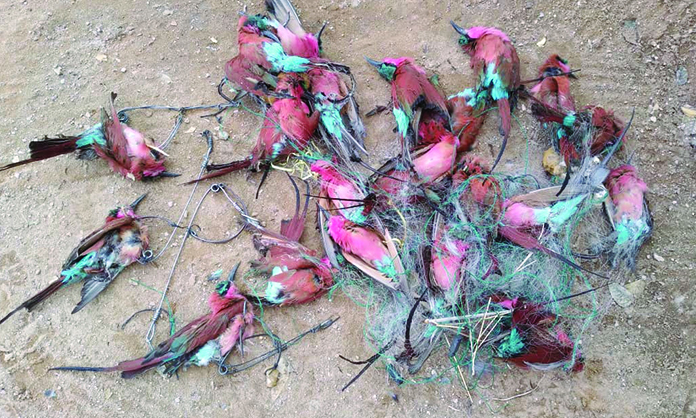The Ministry of Environment, Forestry and Tourism has warned Namibians against killing carmine bee-eater birds.
Ministry spokesperson Romeo Muyunda says the ministry is currently investigating an incident in which these birds were recently killed in the Kavango regions.
“We have been alerted to this awful incident. This is a barbaric act by the community members involved.
“Perhaps there is very little understanding of the significance of these birds for tourism, which contributes to the social and economic development of rural communities,” he says.
Muyunda says carmine bee-eaters are migratory birds that fly to Namibia to breed along the Okavango River and other areas in the country’s north-east.
“Because of their colourful and appealing look, they attract tourists to the country who come to see them. The continued killing of these birds would impact tourism, as well as the country’s conservation reputation.
“We condemn the killing of the birds. Moving foward, we will intensify public education in communities close to the bird colonies.
“We cannot afford to have these birds go extinct in Namibia given their ecological and tourism significance. We equally appeal to community leaders to intervene in this regard.

“Most birds are protected by laws. Killing them illegally may lead to prosecution,” he says.
Environmental activist Mark Paxton says the carmine bee-eaters colomy comprises over 3 000 birds, and is located near Shamvura Camp along the river.
“The colony was first recorded here in about 2005, and is now the largest along this river in Namibia, although there are some smaller colonies in the Divundu area.
“As such, it has been an extremely well-known attraction to thousands of overseas and local visitors to the Kavango region,” he says.
Paxton says this particular colony is subjected to disturbances from the nearby Shamvura/Shinyungwe community every year.
He says the birds have been forced to change their nesting sites regularly on either the Namibian or Angolan river banks.
“The colony is, at this stage, laying and incubating eggs and is at its most vulnerable,” he says.
Paxton says children pose a serious threat to this colony by intentionally disturbing the birds.
“Last year this colony of 3 000 birds split up into four areas along the river, due to human disturbance, where they tried to breed, but were constantly disturbed by these groups of young people who have absolutely no reason to do so.
“This has caused great losses among the birds and immense disappointment to tourists coming from all over the world to see them.
“I appeal to Frans Ndongo, the headman of the Shamvura/Shinyungwe areas, to please stop these groups of people from this illegal and destructive behaviour. It is detrimental not only to the birds, but also to the people of the region” he says.
Paxton says last Friday after visiting this colony with some guests, they found an illegal fishing net had been placed over a section of the breeding colony, as well as several homemade wire traps.
“We managed to save over a dozen birds, but most were either dead or dying after being trapped in the over 40°C heat all day.
“This was an act of pure irresponsible and unnecessary malice. They were not trapped for either food or sale, otherwise they would not have been left for a full day,” he says.
Stay informed with The Namibian – your source for credible journalism. Get in-depth reporting and opinions for
only N$85 a month. Invest in journalism, invest in democracy –
Subscribe Now!










